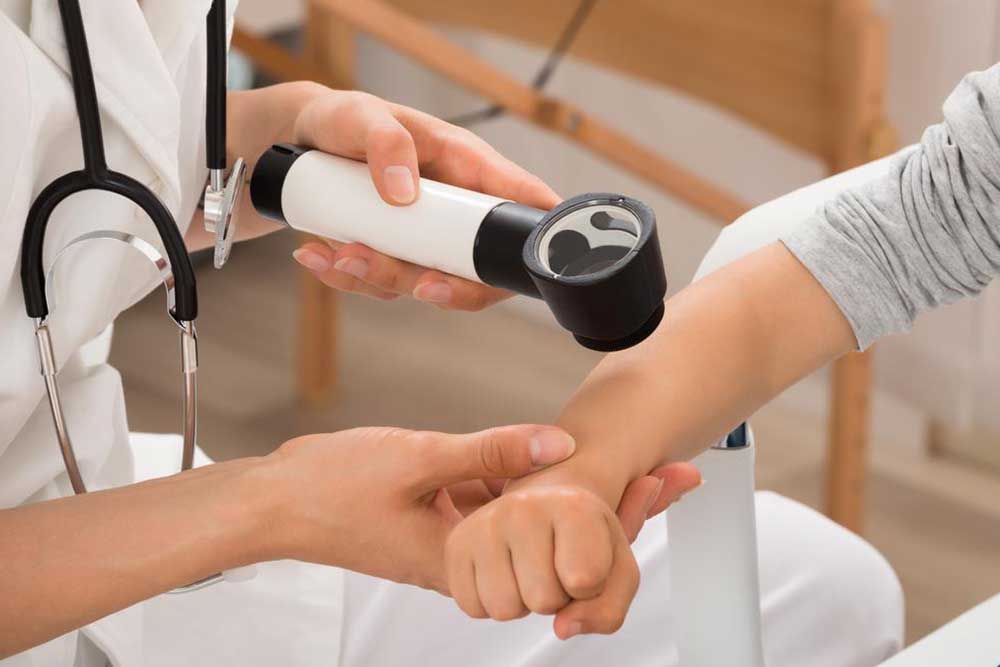Symptoms, Risk Factors, and Health Complications of Psoriasis
Psoriasis is a chronic skin disease that speeds up the natural life cycle of skin cells. The condition causes healthy skin cells to multiply rapidly and grow over the existing skin thus creating red patches on the skin. There are no known causes of psoriasis; however, studies indicate that an imbalance in neutrophils (white blood cells) to aid the immune system fight off infections can trigger an overproduction of skin cells leading to psoriasis.

Overactive T-cells originally designed to attack and destroy infections can turn against the immune system and attack the healthy cells inadvertently triggering an increase in the production of healthy skin cells to counter the attack. Psoriasis is the result of the rapid skin buildup forming the outer layer that can cause painful and sensitive skin patches.
Infections, skin injuries including cuts, scrapes, bites, sunburns, stress, smoking, heavy alcohol consumption, vitamin D deficiency, and side effects of certain medications taken for managing high blood pressure can trigger a psoriasis infection. A family history of people suffering from obesity, viral, and bacterial infections also increase the risk of psoriasis infection.
Plaque psoriasis is one of the most common types of psoriasis that results in dry and raised skin lesions covered with silvery scales. The red patches of skin overgrowth are painful and can appear on any part of the body including one’s genitals and soft tissue areas. Plaque psoriasis can cover a small or large area of the body depending on the severity of the condition.
The condition is chronic in nature and affects approximately 1.5 million people in the country. First signs of plaque psoriasis start showing up between the ages of 18-25 years and the severity of the condition will vary depending on the age during which a person suffers.
Other forms of psoriasis include nail psoriasis, guttate psoriasis, inverse psoriasis, pustular psoriasis, erythrodermic psoriasis, and psoriatic arthritis. These conditions more or less exhibit similar symptoms that one might experience with plaque psoriasis. Medical attention is advisable in case one experiences persistent discomfort or pain while performing routine tasks, changes in the physical appearances of the skin, and health complications as a result of an advanced psoriatic condition.
The symptoms of plaque psoriasis and associated types of psoriasis are given below:
- Skin inflammation
One of the primary indicators of a developing plaque psoriasis condition is the formation of extra skin on the outer layer of the affected area. It is a result of rapid skin growth being pushed outside the epidermis over existing patches that have not yet shed the dead cells. The premature growth of healthy skin cells is exposed to the elements in the environment before they can develop causing pain and itching. - Swollen and stiff joints
Joint pain and inflammation are other known symptoms of plaque psoriasis and associated conditions that limit the range of motion in one’s joints, increase stiffness in the morning and result in the fingers or toes swelling. - Scaling
Scaling and spots are more commonly seen in children but adults can also suffer from the uncontrolled growth of skin that results in red patches and spots. The lesions are smaller and compact in comparison to the red skin patches one develops as a result of plaque psoriasis. - Pitting and ridging of nails
Pitting, abnormal nail growth and discoloration indicate a developing nail psoriasis condition that can result in healthy nail bits crumbling. The fingernails and toenails are most commonly affected due to repeated damage under the nail.
Plaque psoriasis and associated types of psoriasis can lead to multiple health complications including the following:
Emotional problems
The skin and nail damage can affect the psyche of a person resulting in low self-esteem and depression. The physical appearance can force a person to withdraw from one’s immediate social environment.
Kidney problems
There is an increased risk of suffering from kidney problems due to the autoimmune skin disorder. People with psoriasis may also develop other autoimmune diseases including celiac disease, Crohn’s disease, and inflammatory bowel disease.
Cardiovascular disease
Plaque psoriasis and associated types also increase the chances of cardiovascular diseases owing to the symptoms of the autoimmune condition triggering high cholesterol, stroke, and irregular heartbeat. Atherosclerosis is another major health complication that can be the result of inflammation of vital points in the circulatory system.
Arthritis
Psoriatic arthritis is a common problem that results in joint problems causing loss of function in severe cases of psoriasis. It is however not clear as to how the autoimmune disorder can trigger joint damage among other possible health complications.
Treatment for plaque psoriasis, in general, includes a combination of topical applications, phototherapy, and medications to counter the symptoms of the chronic autoimmune disorder. One must also ensure the necessary changes in diet and lifestyle recommended by a medical professional. Alternative medicine is also gaining popularity for treating the varied symptoms of plaque psoriasis and associated types of skin disorder.


